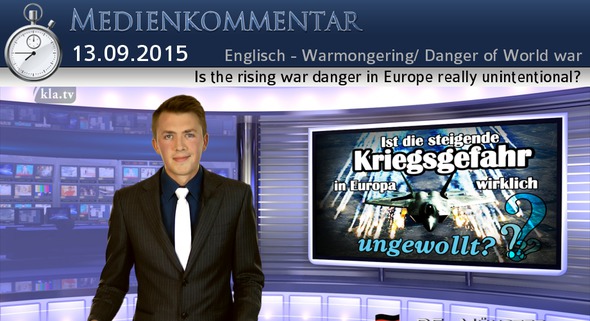Terror (English)
Is the rising war danger in Europe really unintentional?
13.09.2015
Subtitle "Afrikaans" was produced by machine.Subtitle "አማርኛ" was produced by machine.Subtitle "العربية " was produced by machine.Subtitle "Ārāmāyâ" was produced by machine.Subtitle "azərbaycan dili " was produced by machine.Subtitle "беларуская мова " was produced by machine.Подзаглавието "България" е създадено от машина.সাবটাইটেল "বাংলা " মেশিন দ্বারা তৈরি করা হয়েছিল।Subtitle "བོད་ཡིག" was produced by machine.Subtitle "босански" was produced by machine.Subtitle "català" was produced by machine.Subtitle "Cebuano" was produced by machine.Subtitle "ગુજરાતી" was produced by machine.Subtitle "corsu" was produced by machine.Podtitul "Čeština" byl vytvořen automaticky.Subtitle "Cymraeg" was produced by machine.Subtitle "Dansk" was produced by machine.Untertitel "Deutsch" wurde maschinell erzeugt.Subtitle "Untertitel" was produced by machine.Ο υπότιτλος "Ελληνικά" δημιουργήθηκε αυτόματα.Subtitle "English" was produced by machine.Subtitle "Esperanto" was produced by machine.El subtítulo "Español" se generó automáticamente.Subtitle "Eesti" was produced by machine.Subtitle "euskara" was produced by machine.Subtitle "فارسی" was produced by machine.Subtitle "Suomi" was produced by machine.Le sous-titrage "Français" a été généré automatiquement.Subtitle "Frysk" was produced by machine.Subtitle "Gaeilge" was produced by machine.Subtitle "Gàidhlig" was produced by machine.Subtitle "Galego" was produced by machine.Subtitle "Schwizerdütsch" was produced by machine.Subtitle "هَوُسَ" was produced by machine.Subtitle "Ōlelo Hawaiʻi" was produced by machine.Subtitle "עברית" was produced by machine.Subtitle "हिन्दी" was produced by machine.Subtitle "Mẹo" was produced by machine.Podnaslov "Hrvatski" generiran je automatski.Subtitle "Kreyòl ayisyen " was produced by machine.Subtitle "Magyar" was produced by machine.Subtitle "Հայերեն" was produced by machine.Subtitle "Bahasa Indonesia " was produced by machine.Subtitle "Asụsụ Igbo " was produced by machine.Textun"Íslenska" var framkvæmt vélrænt.Sottotitoli "Italiano" sono stati generati con l'intelligenza artificiale.字幕は"日本語" 自動的に生成されました。Subtitle "Basa Jawa" was produced by machine.Subtitle "ქართული" was produced by machine.Subtitle "қазақ тілі " was produced by machine.Subtitle "ភាសាខ្មែរ" was produced by machine.Subtitle "ಕನ್ನಡ" was produced by machine.Subtitle "한국어" was produced by machine.Subtitle "कोंकणी語" was produced by machine.Subtitle "کوردی" was produced by machine.Subtitle "Кыргызча" was produced by machine.Subtitle " lingua latina" was produced by machine.Subtitle "Lëtzebuergesch" was produced by machine.Subtitle "Lingala" was produced by machine.Subtitle "ພາສາ" was produced by machine.Antraštė "Lietuvių" buvo sukurta mašina.Subtitle "Latviešu" was produced by machine.Subtitle "fiteny malagasy" was produced by machine.Subtitle "te reo Māori" was produced by machine.Subtitle "македонски јазик" was produced by machine.Subtitle "malayāḷaṁ" was produced by machine.Subtitle "Монгол хэл" was produced by machine.Subtitle "मराठी" was produced by machine.Subtitle "Bahasa Malaysia" was produced by machine.Subtitle "Malti" was produced by machine.Subtitle "မြန်မာစာ " was produced by machine.Subtitle "नेपाली" was produced by machine.Ondertitels "Nederlands" machinaal geproduceerd.Subtitle "Norsk" was produced by machine.Subtitle "chiCheŵa" was produced by machine.Subtitle "ਪੰਜਾਬੀ" was produced by machine.Podtytuł "Polska" został utworzony przez maszynę.Subtitle "پښتو" was produced by machine.Legenda "Português" foi gerada automaticamente.Subtitle "Română" was produced by machine.Subtitle "Язык жестов (Русский)" was produced by machine.Субтитры "Pусский" были созданы машиной.Subtitle "Kinyarwanda" was produced by machine.Subtitle "सिन्धी" was produced by machine.Subtitle "Deutschschweizer Gebärdensprache" was produced by machine.Subtitle "සිංහල" was produced by machine.Subtitle "Slovensky" was produced by machine.Subtitle "Slovenski" was produced by machine.Subtitle "gagana fa'a Samoa" was produced by machine.Subtitle "chiShona" was produced by machine.Subtitle "Soomaaliga" was produced by machine.Titra "Shqip" u krijua automatikisht.Превод "србски" је урађен машински.Subtitle "Sesotho" was produced by machine.Subtitle "Basa Sunda" was produced by machine.Undertext "Svenska" är maskinell skapad.Subtitle "Kiswahili" was produced by machine.Subtitle "தமிழ்" was produced by machine.Subtitle "తెలుగు" was produced by machine.Subtitle "Тоҷикй" was produced by machine.Subtitle "ภาษาไทย" was produced by machine.ንኡስ ኣርእስቲ "ትግርኛ" ብማሽን እዩ ተፈሪዩ።Subtitle "Türkmençe" was produced by machine.Subtitle "Tagalog" ay nabuo sa pamamagitan ng makina.Altyazı "Türkçe" otomatik olarak oluşturuldu.Subtitle "татар теле" was produced by machine.Subtitle "Українська " was produced by machine.ذیلی عنوان "اردو" مشین کے ذریعہ تیار کیا گیا تھا۔Subtitle "Oʻzbek" was produced by machine.Phụ đề được tạo bởi máy.Subtitle "Serbšćina" was produced by machine.Subtitle "isiXhosa" was produced by machine.Subtitle "ייִדיש" was produced by machine.Subtitle "Yorùbá" was produced by machine.Subtitle "中文" was produced by machine.Subtitle "isiZulu" was produced by machine.
kla.TV accepts no liability for defective translation.kla.TV accepts no liability for defective translation.kla.TV accepts no liability for defective translation.kla.TV accepts no liability for defective translation.kla.TV accepts no liability for defective translation.kla.TV accepts no liability for defective translation.kla.TV не носи отговорност за некачествен превод.অপর্যাপ্ত অনুবাদের জন্য kla.TV কোন দায় বহন করে না।kla.TV accepts no liability for defective translation.kla.TV accepts no liability for defective translation.kla.TV accepts no liability for defective translation.kla.TV accepts no liability for defective translation.kla.TV accepts no liability for defective translation.kla.TV accepts no liability for defective translation.kla.TV nenese žádnou odpovědnost za chybné překlady.kla.TV accepts no liability for defective translation.kla.TV accepts no liability for defective translation.kla.TV übernimmt keine Haftung für mangelhafte Übersetzung.kla.TV accepts no liability for inadequate translationΗ kla.TV δεν φέρει καμία ευθύνη για ανεπαρκή μετάφραση.kla.TV accepts no liability for defective translation.kla.TV accepts no liability for defective translation.kla.TV no se hace responsable de traducciones incorrectas.kla.TV accepts no liability for defective translation.kla.TV accepts no liability for defective translation.kla.TV accepts no liability for defective translation.kla.TV accepts no liability for defective translation.kla.TV n'assume aucune responsabilité en cas de mauvaise traduction.kla.TV accepts no liability for defective translation.kla.TV accepts no liability for defective translation.kla.TV accepts no liability for defective translation.kla.TV accepts no liability for defective translation.kla.TV accepts no liability for defective translation.kla.TV accepts no liability for defective translation.kla.TV accepts no liability for defective translation.kla.TV accepts no liability for defective translation.kla.TV accepts no liability for defective translation.kla.TV accepts no liability for defective translation.kla.TV ne preuzima nikakvu odgovornost za neadekvatne prijevode.kla.TV accepts no liability for defective translation.kla.TV nem vállal felelősséget a hibás fordításértkla.TV accepts no liability for defective translation.kla.TV accepts no liability for defective translation.kla.TV accepts no liability for defective translation.kla.TV tekur enga ábyrgð á áræðanleika þýðingarinnarKla.TV non si assume alcuna responsabilità per traduzioni lacunose e/o errate.Kla.TV は、不適切な翻訳に対して一切の責任を負いません。kla.TV accepts no liability for defective translation.kla.TV accepts no liability for defective translation.kla.TV accepts no liability for defective translation.kla.TV accepts no liability for defective translation.kla.TV accepts no liability for defective translation.kla.TV accepts no liability for defective translation.kla.TV accepts no liability for defective translation.kla.TV accepts no liability for defective translation.kla.TV accepts no liability for defective translation.kla.TV accepts no liability for defective translation.kla.TV accepts no liability for defective translation.kla.TV accepts no liability for defective translation.kla.TV accepts no liability for defective translation.kla.TV neprisiima jokios atsakomybės už netinkamą vertimą.kla.TV accepts no liability for defective translation.kla.TV accepts no liability for defective translation.kla.TV accepts no liability for defective translation.kla.TV accepts no liability for defective translation.kla.TV accepts no liability for defective translation.kla.TV accepts no liability for defective translation.kla.TV accepts no liability for defective translation.kla.TV accepts no liability for defective translation.kla.TV accepts no liability for defective translation.kla.TV accepts no liability for defective translation.kla.TV accepts no liability for defective translation.kla.TV aanvaardt geen aansprakelijkheid voor foutieve vertalingen.kla.TV accepts no liability for defective translation.kla.TV accepts no liability for defective translation.kla.TV accepts no liability for defective translation.kla.TV nie ponosi odpowiedzialności za wadliwe tłumaczenie.kla.TV accepts no liability for defective translation.kla.TV não se responsabiliza por traduções defeituosas.kla.TV accepts no liability for defective translation.kla.TV accepts no liability for defective translation.kla.TV не несет ответственности за некачественный перевод.kla.TV accepts no liability for defective translation.kla.TV accepts no liability for defective translation.kla.TV accepts no liability for defective translation.kla.TV accepts no liability for defective translation.kla.TV accepts no liability for defective translation.kla.TV accepts no liability for defective translation.kla.TV accepts no liability for defective translation.kla.TV accepts no liability for defective translation.kla.TV accepts no liability for defective translation.kla.TV nuk mban asnjë përgjegjësi për përkthime joadekuate.kla.TV не преузима никакву одговорност за неадекватне преводе..kla.TV accepts no liability for defective translation.kla.TV accepts no liability for defective translation.Kla.TV tar inget ansvar för felaktiga översättningar.kla.TV accepts no liability for defective translation.kla.TV accepts no liability for defective translation.kla.TV accepts no liability for defective translation.kla.TV accepts no liability for defective translation.kla.TV accepts no liability for defective translation.kla.TV ንዝኾነ ጉድለት ትርጉም ዝኾነ ይኹን ሓላፍነት ኣይቅበልን እዩ።kla.TV accepts no liability for defective translation.kla. Walang pananagutan ang TV sa mga depektibong pagsasalin.kla.TV hatalı çeviriler için hiçbir sorumluluk kabul etmez.kla.TV accepts no liability for defective translation.kla.TV accepts no liability for defective translation.kla.TV عیب دار ترجمہ کے لیے کوئی ذمہ داری قبول نہیں کرتا ہے۔kla.TV accepts no liability for defective translation.Kla. TV không chịu trách nhiệm về bản dịch không đầy đủ.kla.TV accepts no liability for defective translation.kla.TV accepts no liability for defective translation.kla.TV accepts no liability for defective translation.kla.TV accepts no liability for defective translation.kla.TV accepts no liability for defective translation.kla.TV accepts no liability for defective translation.
Is the rising war danger in Europe really unintentional?
13.09.2015
www.kla.tv/6704
The preconditions for a war in Europe are increasing dramatically. However, to what extent is Gsteigers interpretation correct, that the rising danger of war in Europe is supposedly unintentional?
[continue reading]
Is the rising war danger in Europe really unintentional?
Download broadcast and attachments in the wanted quality:
Hashtags:
Useage rights:
Standard-Kla.TV-Licence

 Deutsch-ID setzten
Deutsch-ID setzten



Sendungstext
herunterladen
13.09.2015 | www.kla.tv/6704
On Aug 17th 2015 in the Swiss radio SRF1 evening news “Echo der Zeit“, international editor Fredy Gsteiger concluded the following: "Military maneuvers raise the war danger in Europe.“ Russia as well as NATO have increasingly carried out more military maneuvers during the last months. NATO secretary general Jens Stoltenberg is proud of the first maneuvers of the new quick task forces in Eastern Europe, I quote: “Soldiers from nine different nations co-operate as one man together and demonstrate that NATO is prepared for the new demands …” Sergei Lawrow, Russia’s foreign minister in turn, was speaking of the need, to train the army more intensely. Both sides stressed, that of course it was only about defensive precautions. Nevertheless, Fredy Gsteiger still sees an increasing danger and refers to Thomas Frear who analyzed the latest maneuvers for the “European Leadership Network” in London. Frear sees a dangerous and increasingly intense sequence of action and reaction, a spiral turning faster and faster. Absolutely understandably, on both sides, there is a growing feeling of insecurity; and due to this, according to Thomas Frear, the need to arm themselves militarily. NATO however, has a different view and reacted sharply to the study, according to Fredy Gsteiger. Their own maneuvers served only the stabilization of the security situation in Europe, NATO announced. Moreover that these were moderate and transparent. Although NATO refuses to admit it, these common characteristics dominate, Gsteiger commented. Both sides focus on quick mobilization, on troop movements over large distances, on sea and air superiority and also on combat against irregular troops. According to Frear, this may well serve defensive purposes, but all these elements are also necessary for quick offensive operations. Gsteiger comes to the conclusion, I quote: “So the war danger in Europe rises, not because either of the sides want it this way, but because on both sides the conditions for confrontations are created. Once the conditions are there, an accident, an incident, a misunderstanding can trigger a war.” So far that is the assessment of SRF’s international editor Fredy Gsteiger. The preconditions for a war in Europe are increasing dramatically. However, to what extent is Gsteigers interpretation correct, that the rising danger of war in Europe is supposedly unintentional? Let's remember the last air raids of NATO in Europe. These began against Belgrade on the 24th of March 1999 in the course of the Kosovo war. At times more than 1,000 NATO airplanes were involved. It was the first war which NATO waged going beyond common defense as well as without explicit UN mandate. Previously, the proclamation of a mutual defense case and consequently an entry into war was only possible if an ally was attacked. What was the reason for NATO’s military intervention and was it deliberate or not? The NATO attack against the Federal Republic of Yugoslavia was justified by the claim of trying to avert a supposed “humanitarian disaster”. The Yugoslavian security forces under the control of Slobodan Milošević, at that time President of Yugoslavia, were said to have been involved in numerous human rights injuries among the Albanian population, up to the reproach of ethnic cleansing. According to official statements NATO air raids were also actions of "self-defense" and not intentionally planned. In contrast, several employees of OSCE - the "Organization for Security and Cooperation in Europe" – have a different view. Norma Brown, a close colleague of OSCE boss William Walker said, I quote: “There was no humanitarian disaster in Kosovo before the NATO air raids began. And that only these would cause the disaster was known to everybody in NATO, OSCE and our observer group.” According to OSCE, previous to the bombardment by NATO, only 39 dead were counted in the whole country of Kosovo on both sides. Among them, there was not a single civilian victim. But the NATO bomb attacks, according to the German “AG Peace Research”, killed 2,500 innocent civilians and more than 10,000 were injured. Furthermore, according to OSCE, a political solution between the opposing parties was already emerging. Also the published alleged evidence of Milošević’s guilt in supposed war crimes, are was apparently faked by western media. Editors of the German TV program "Monitor" represented this opinion in a documentary from 1999 as well as notable German journalists like Oliver Tolmein, Georg Fülberth, Jürgen Elsässer and others. According to these and other dissenting voices, the NATO air raids in 1999 on Yugoslavia were unlawful, founded upon lies and brought about intentionally. Also the German Jochen Scholz confirmed this, at that time lieutenant-colonel of NATO. According to Scholz, NATO's military planning for aerial warfare against Yugoslavia was concluded already in 1998 and entering the war was fully intentional - and this in spite of the OSCE report, according to which, no humanitarian disaster was happening which could have justified a military operation. The reason why the NATO air raids were intended from the outset, Scholz explained, was the fact that due to the geographically interesting position of Yugoslavia, especially EU and NATO eastward expansion was on the agenda. I cite Scholz: “And there is a foreign body present, this half-socialist Yugoslavia which opposes all conditions - imposed from the outside. For example Serbia has always refused to accept the credit conditions of the International Monetary Fund; it did not participate for social reasons. So the "foreign body" had to be removed.” End Quote. All these hints indicate that the Yugoslavia war was very certainly intended by NATO in 1999. If Fredy Gsteiger had investigated the NATO air raids in 1999 seriously and extensively, according to journalism’s guidelines, most certainly a different result would have emerged in his conclusions. As history shows, a war in Europe can very well be waged intentionally, namely by NATO, as has been proven. This is why, it is absolutely necessary to watch out for any kind of war propaganda and justification for entry into war. We need to expose even the smallest attempts. This is the only way to prevent another "intentional" war. Join us again next time on Kla.tv.
from dd.
http://www.nato.int/cps/en/natohq/opinions_120718.htm
http://www.ag-friedensforschung.de/themen/NATO-Krieg/ard08-02-01.html
http://www.youtube.com/watch?v=NqPnn-GD4-k
https://de.wikipedia.org/wiki/Kosovokrieg
https://de.wikipedia.org/wiki/Slobodan_Milo%C5%A1evi%C4%87
http://www.nachrichtenspiegel.de/2010/11/05/luegenkrieg-und-viertes-reich/
http://www.youtube.com/watch?v=NqPnn-GD4-k
http://www.graswurzel.net/254/rambouillet.shtml
http://www.tagesspiegel.de/politik/vorlaeufige-bilanz-der-opfer-und-schaeden-im-kosovo-krieg-liegt-vor/79548.html
http://www.ag-friedensforschung.de/themen/NATO-Krieg/10-jahre-2.html